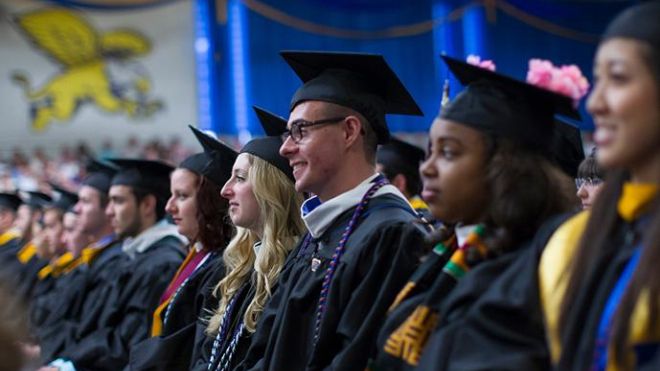BUFFALO, NY - Stephen J. Molvarec ’02 stepped off a Greyhound bus at the Salt Lake City terminal and a sense of trepidation washed over him. He was new to the city, had no place to stay and virtually no money in his pockets. Unsure what to do, Molvarec simply walked the streets for hours. When night fell, he took shelter on the steps outside a small church. Tucked up against the doors to protect himself from the cold air, Molvarec wondered aloud, “God, I thought you were supposed to provide for me.”
Molvarec’s night on the street marked the beginning of many hardships he would encounter during a month-long pilgrimage, which Jesuit novices make while discerning life in the Society of Jesus.
The pilgrimage is one of six prescribed experiences for Jesuit novices, outlined by the Society’s founder, St. Ignatius Loyola. It instructs them to spend 30 days away, “without money … begging from door to door … to grow accustomed to discomfort in food and lodging.” The pilgrimage comes in the wake of a 30-day silent retreat, during which novices make the Spiritual Exercises of St. Ignatius. The Exercises foster a novice’s trust in God and his deeper companionship with Jesus Christ. The pilgrimage tests a novice’s trust and sense of companionship further.
Novices on pilgrimage are stripped of modern-day amenities. “No computers, cellphones or cameras,” explains Molvarec. They can bring with them only what they’re able to fit in a backpack. (Molvarec squeezed into his, a single change of clothes, a water bottle, a Bible, a prayer book, a journal and a pair of sandals.) On the day of their departures, novices receive $35 and one-way bus tickets to pre-determined destinations. Wherever the pilgrimage takes them after that depends on prayerful discernment and the graces each novice wants to seek while on the road.
“The four words that showed up in my prayers were solitude, community, poverty and providence,” recalls Molvarec. “These were the things I wanted to encounter during my pilgrimage and they served as compass points.”
Though each pilgrimage experience is different, all involve degrees of anxiety. There are the obvious concerns: money, food and finding a safe place to sleep.
There are also less discernable discomforts.
Molvarec felt out of place in each strange new city, “not knowing anyone or anything.” He grew uncomfortable about his appearance, without being able to regularly shower or shave. “(Two) churches threw me out because of how I looked,” he recalls. Molvarec also became uneasy with the counter-culture in some cities. He often witnessed homeless people using drugs in public – sometimes right next to him on park benches. “There were definitely days when I felt very alone and unnerved,” he recalls.
For every instance of anxiety, however, Molvarec shares another of reassurance.
There was the pastor who offered Molvarec a warm meal and place to stay in exchange for manual labor around the church. A college student, who saw Molvarec sleeping outside, brought him a coat and sleeping bag to keep warm. Then there were the parishioners who made a point to embrace the bedraggled Molvarec during the sign of peace at Mass. Afterwards, they invited him to join them for coffee and pastry.
“For me, the pilgrimage built a foundation of trust in my relationship with God,” says Molvarec. “When people offered their generosity, I came to trust that this was God’s way of providing for me.”
This trust, amidst such uncertain circumstances, unleashed a new sense of freedom in Molvarec. He rid himself of his fears and chose instead “to view moments of challenge as great liberations.” Throughout the remainder of his travels (which took him from Salt Lake City to Berkley, CA and north to Portland, OR and Spokane and Seattle, WA), Molvarec welcomed discomfort - even sought it out - and found God’s will at work in the most unforeseen people and places.
The young novice befriended a homeless man named Matthew, whom he tried to assist in his struggle for sobriety. Turns out, Matthew helped Molvarec, as well.
“He always brought our conversations back to the Bible,” says Molvarec. “It was striking at first but upon reflection I think Matthew saw me as a channel to God’s grace. He certainly was that for me.”
Another encounter, this time with a mentally ill patient in a psychiatric ward, reminded Molvarec that we are all one in Jesus Christ. He and “Mark” shared similarities in their lives and as Mark shared his story, “I thought none of us is as far or as separate from the other as we think. We all belong to God and therefore to one another.”
Coincidentally, one of the darkest points during Molvarec’s pilgrimage also turned out to be the most enlightening.
It was May 3 (Molvarec’s birthday) and he just arrived in another new city with no money and no place to stay. “I was really depressed and I remember thinking to myself ‘What am I doing?’”
He was reminded by Kyle.
The homeless man sat down next to Molvarec and suddenly began to point to each passerby. “That woman over there is God,” he said aloud. “That man, he is God, too.” Kyle continued to point out God with each passerby.
“He reminded me that God is, in fact, everywhere and in all things,” says Molvarec. “This is the very core of Ignatian spirituality. God is always active in our world. We just have to look for Him.”
This unexpected grace and the many others Molvarec encountered during his pilgrimage, endure as he continues on his path to the priesthood.
Since returning, Molvarec has served the poor and marginalized in homeless shelters, hospitals and prisons. In August 2014, he pronounced his perpetual vows. Molvarec is currently engaged in his First Studies at Loyola University Chicago.
Always, he keeps the lessons he learned while on the road at the forefront of his formation. He expects that’s where they’ll remain.
“The pilgrimage taught me to live deeply, simply and freely; to be open, generous and available; and to meet people truly where and as they are,” says Molvarec. “I learned that when you seek the God of the ordinary, you will find Him in people and places that are extraordinary.”



